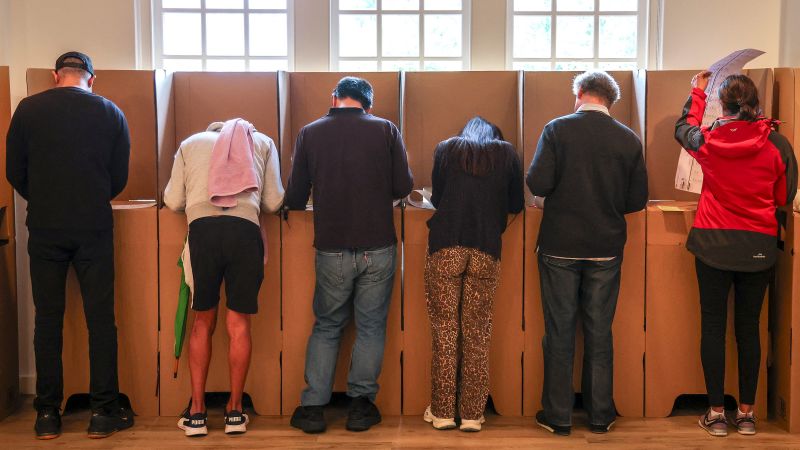The Obesity Crisis: Improving Data Collection For Minoritised Ethnic Groups

Welcome to your ultimate source for breaking news, trending updates, and in-depth stories from around the world. Whether it's politics, technology, entertainment, sports, or lifestyle, we bring you real-time updates that keep you informed and ahead of the curve.
Our team works tirelessly to ensure you never miss a moment. From the latest developments in global events to the most talked-about topics on social media, our news platform is designed to deliver accurate and timely information, all in one place.
Stay in the know and join thousands of readers who trust us for reliable, up-to-date content. Explore our expertly curated articles and dive deeper into the stories that matter to you. Visit NewsOneSMADCSTDO now and be part of the conversation. Don't miss out on the headlines that shape our world!
Table of Contents
The Obesity Crisis: Improving Data Collection for Minoritized Ethnic Groups
The global obesity crisis is a complex issue, demanding comprehensive solutions. However, a significant obstacle hindering effective intervention strategies lies in the inconsistent and often inadequate data collection methods for minoritized ethnic groups. This lack of robust, representative data obscures the true extent of the problem within these communities, hindering the development of targeted and effective preventative measures. This article explores the challenges in current data collection practices and proposes vital steps towards improvement.
The Current Data Deficit: A Systemic Problem
Current health data collection often suffers from several critical flaws when it comes to representing minoritized ethnic groups accurately. These flaws include:
-
Insufficient Data Granularity: Many datasets aggregate data broadly, masking crucial variations within and between different ethnic groups. For example, lumping together all "Asian" populations ignores significant differences in obesity prevalence between specific subgroups like South Asians, East Asians, and Southeast Asians. This lack of nuance renders interventions less precise and less effective.
-
Underrepresentation and Missing Data: Minoritized ethnic groups are frequently underrepresented in health surveys and studies. This can be due to factors such as language barriers, cultural mistrust of healthcare systems, and a lack of culturally competent data collectors. The resulting "missing data" biases epidemiological models and undermines the accuracy of national-level statistics.
-
Inconsistent Data Definitions and Measurement: Variations in how obesity is defined and measured across different studies and datasets complicate cross-study comparisons and meta-analyses. This inconsistency is particularly problematic when analyzing data for diverse populations with different body compositions and genetic predispositions.
-
Limited Contextual Data: Effective interventions require understanding the social determinants of health, such as socioeconomic status, access to healthy food, and neighborhood safety. Currently, data collection often lacks the granular contextual data necessary to understand how these factors interact with ethnicity and obesity risk.
Addressing the Data Gap: A Path Forward
Improving data collection for minoritized ethnic groups requires a multi-pronged approach:
1. Culturally Competent Data Collection: Training data collectors on cultural sensitivity and language proficiency is crucial. This includes understanding the nuances of communication styles, addressing potential cultural biases, and ensuring data collection materials are translated accurately and culturally appropriate.
2. Community Engagement and Participation: Involving community leaders and representatives in the design and implementation of data collection efforts is essential to build trust and improve participation rates. This participatory approach ensures that data collection methods are relevant and respectful of cultural norms.
3. Enhanced Data Granularity and Disaggregation: Collecting data at a more granular level—disaggregating data by specific ethnic subgroups and considering relevant intersectional factors (e.g., socioeconomic status, gender)—is paramount. This allows for a more nuanced understanding of obesity prevalence and its associated risk factors within specific communities.
4. Standardized Measurement and Definitions: Adopting standardized definitions and measurement tools for obesity across studies is vital for ensuring data comparability and facilitating robust meta-analyses. This consistency is crucial for developing evidence-based interventions.
5. Investing in Research Infrastructure: Further investment in research infrastructure, including funding for culturally competent research teams and longitudinal studies, is necessary to generate high-quality, reliable data on obesity within minoritized ethnic groups.
Conclusion: Data is Power
Accurate and representative data on obesity within minoritized ethnic groups is not just a statistical imperative; it's a matter of health equity. By addressing the shortcomings in current data collection practices and implementing the recommendations outlined above, we can pave the way for the development of effective, targeted interventions that improve the health and well-being of these communities. The fight against the obesity crisis demands comprehensive understanding, and this starts with better data.

Thank you for visiting our website, your trusted source for the latest updates and in-depth coverage on The Obesity Crisis: Improving Data Collection For Minoritised Ethnic Groups. We're committed to keeping you informed with timely and accurate information to meet your curiosity and needs.
If you have any questions, suggestions, or feedback, we'd love to hear from you. Your insights are valuable to us and help us improve to serve you better. Feel free to reach out through our contact page.
Don't forget to bookmark our website and check back regularly for the latest headlines and trending topics. See you next time, and thank you for being part of our growing community!
Featured Posts
-
 Garcia Haney Lopez Ready To Fight Nyc Weigh In Results
May 03, 2025
Garcia Haney Lopez Ready To Fight Nyc Weigh In Results
May 03, 2025 -
 Police Department Faces Backlash Over Ethnic Minority Hire Following Failed Interview
May 03, 2025
Police Department Faces Backlash Over Ethnic Minority Hire Following Failed Interview
May 03, 2025 -
 Albanese Vs Dutton Who Will Better Handle Australias Growing Security Risks
May 03, 2025
Albanese Vs Dutton Who Will Better Handle Australias Growing Security Risks
May 03, 2025 -
 Haney Vs Ramirez Benn Predicts Haney Upset Cites Mental Weakness
May 03, 2025
Haney Vs Ramirez Benn Predicts Haney Upset Cites Mental Weakness
May 03, 2025 -
 Is Australias Vote A Reflection Of Worldwide Anti Trump Sentiment
May 03, 2025
Is Australias Vote A Reflection Of Worldwide Anti Trump Sentiment
May 03, 2025
Latest Posts
-
 Ufc Des Moines Sandhagen Vs Figueiredo Fight Results And Highlights
May 04, 2025
Ufc Des Moines Sandhagen Vs Figueiredo Fight Results And Highlights
May 04, 2025 -
 Gigi Hadids 30th Birthday Engagement Rumors Swirl With Bradley Cooper
May 04, 2025
Gigi Hadids 30th Birthday Engagement Rumors Swirl With Bradley Cooper
May 04, 2025 -
 Ufc Des Moines Results Full Breakdown Of Sandhagen Vs Figueiredo Fight Card
May 04, 2025
Ufc Des Moines Results Full Breakdown Of Sandhagen Vs Figueiredo Fight Card
May 04, 2025 -
 Stephanie Gilmore Eyes Gold Coast Glory Undeterred Drive For Success
May 04, 2025
Stephanie Gilmore Eyes Gold Coast Glory Undeterred Drive For Success
May 04, 2025 -
 Can Tesla Dojo Chips Challenge Nvidias Gpu Dominance
May 04, 2025
Can Tesla Dojo Chips Challenge Nvidias Gpu Dominance
May 04, 2025
